Easy Rainbow Eating Diet Meal Plan for Beginners: Vibrant, Simple & Effective
Why Are You Struggling to Eat Healthy?
Have you ever stared at your plate and thought, “This looks… beige”? You’re not alone, Many beginner meal planners get stuck in bland territory, plain rice, monotonous salads, same old veggies and Let’s be real, starting a new diet can feel overwhelming, Especially when you’re bombarded with conflicting advice, confusing nutrition labels and a million fad diets promising quick fixes. If you’re a beginner looking for something simple, sustainable and delicious, then the Easy Rainbow Eating Diet Meal Plan for Beginners is exactly what you need.
This isn’t about calorie counting or cutting out entire food groups. It’s about filling your plate with nature’s most colorful offerings, each color representing unique nutrients that support different aspects of your health.
By the end of this article, you’ll have:
✅ A complete 7-day beginner-friendly meal plan
✅ Tips to avoid common mistakes
✅ Fact about why Rainbow eating diet matters
✅ Answers to your most pressing questions
So, let’s dive into the world of colorful, joyful, and nutritious eating!
Also read – How to Read Food Labels for Healthy Choices
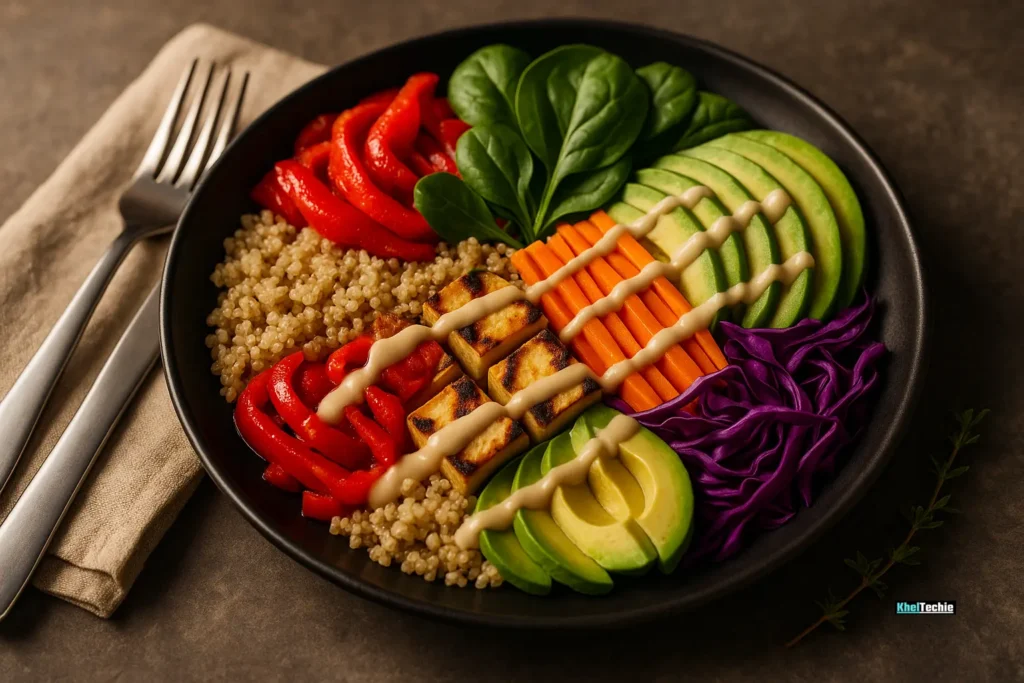
What Is the Easy Rainbow Eating Diet Meal Plan for Beginners?
You’ve probably heard eat the rainbow before, but this isn’t some woo-woo trend. The rainbow eating diet is a fun and science-backed way to eat more fruits and vegetables by incorporating foods of every color of the rainbow – red, orange, yellow, green, blue, indigo, and violet. Each color represents different phytonutrients, a plant compounds that protect against diseases, boost immunity and improve overall wellness. What makes it awesome for beginners? It’s flexible, visual, and delicious. No calorie math, No off-limits foods and Just real stuff your body craves.
For beginners, this approach is ideal because:
- It’s flexible: No rigid restrictions.
- It’s intuitive: Learn to listen to your body’s needs.
- It’s budget-friendly: Many colorful foods are affordable and seasonal.
- It’s visually appealing: Who doesn’t love a beautiful plate?
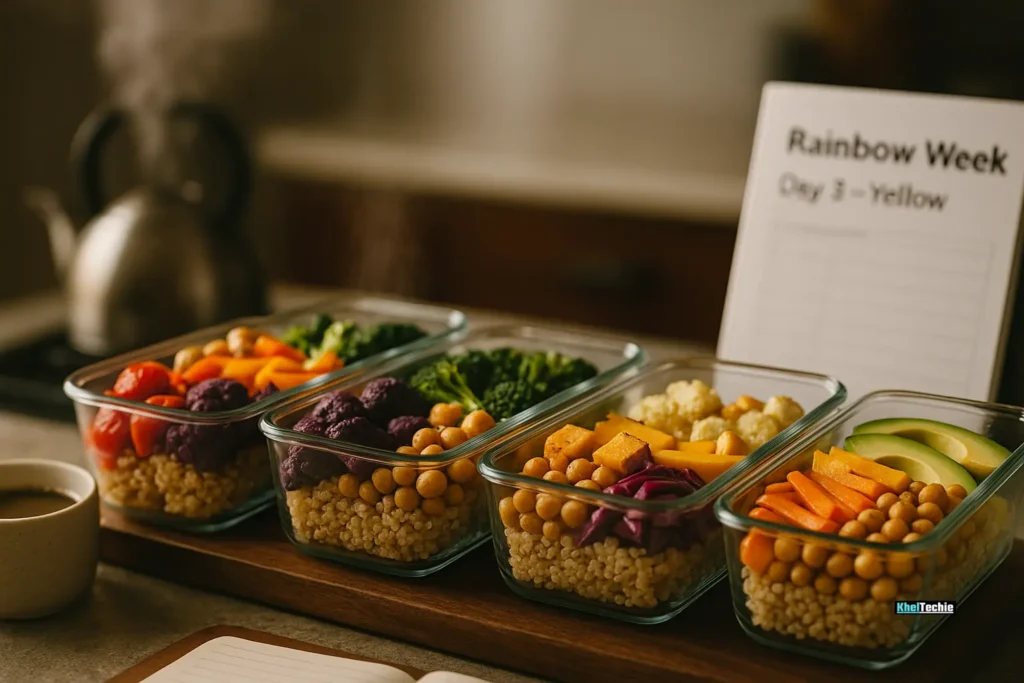
Why Rainbow Eating Diet Meal Plan Matters?
Let’s cut to the chase, piling your plate with colorful produce is more than a pretty picture, it’s a game changer for your health.
First off, per EatingWell (June 2025), rainbow eating is now deemed the top anti-inflammatory habit nutritionists recommend. Those vibrant plant pigments, anthocyanins from blueberries and carotenoids from kale and carrots, actively fight inflammation, fortify your gut lining and ramp up your immune defenses and guess what? Most Americans don’t eat nearly enough colorful fruits and veggies, so just upping your color intake can yield big wins .
But there’s more, A recent study of 124,000 people in the UK revealed that folks who eat a variety of flavonoid-rich foods yes, think berries, apples, tea, dark chocolate, can lower their risk of cancer and chronic disease by about 8%. The key isn’t just quantity, it’s diversity, get different types of flavonoids daily.
Here’s what science says about the benefits of eating the rainbow:
| Color | Key Nutrient | Health Benefit |
|---|---|---|
| Red | Lycopene | Supports heart health and may reduce cancer risk |
| Orange/Yellow | Beta-carotene | Promotes eye health and skin vitality |
| Green | Chlorophyll, Folate | Detoxifies the liver and supports cell function |
| Blue/Purple | Anthocyanins | Enhances brain function and memory |
| White | Allicin | Strengthens immune system and fights inflammation |
So here’s the simple truth, Eat more colors and a mix of them. It’s an easy, science-backed strategy that fights inflammation, strengthens your gut and protects you from serious illnesses. Who knew eating pretty could be so powerful?
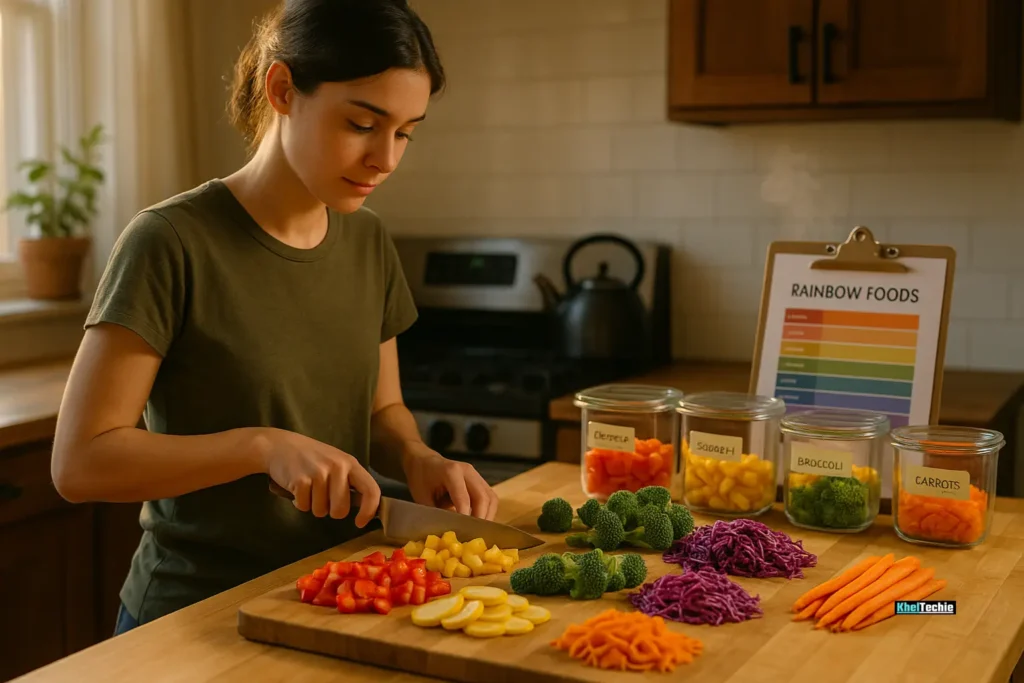
How to Start Your Rainbow Journey Step-by-Step
Follow these 7 steps to make rainbow eating easy and sustainable:
1. Plan Your Colors
Aim for at least three different colors per meal:
- 🟥 Red = tomatoes, strawberries
- 🟧 Orange = carrots, sweet potatoes
- 🟨 Yellow = bell peppers, pineapple
- 🟩 Green = spinach, broccoli
- 🟦 Blue/Purple = blueberries, beets
- 🤍 White = cauliflower, onions
2. Stock Smart
Buy a mix of fresh, frozen & canned all count. Frozen produce is often ripest and nutrient‑dense.
3. Batch Prep
Chop rainbow veggies on Sunday to roast, steam or mix in bowls, smoothie packs, grain bowls, veggie trays and make weekday cooking effortless.
4. Build Balanced Bowls
Combine color + protein + whole grains + healthy fat:
- Base: quinoa (beige)
- Veggies: roasted red pepper + kale + purple cabbage
- Protein: chickpeas or grilled chicken
- Fat: avocado drizzle
5. Mix & Swap Weekly
Rotate produce to cover phytonutrient diversity & try a new veggie or fruit each week.
6. Mindful Snacking
Replace chips with colorful snacks:
- Orange baby carrots + hummus
- Greek yogurt with mixed berries
- Bell pepper slices with tzatziki
7. Track & Reflect
Use an Eat‑The‑Rainbow Chart or app, aiming for 30+ color-source servings weekly for variety.
Frozen veggies? They count, No need to stress.
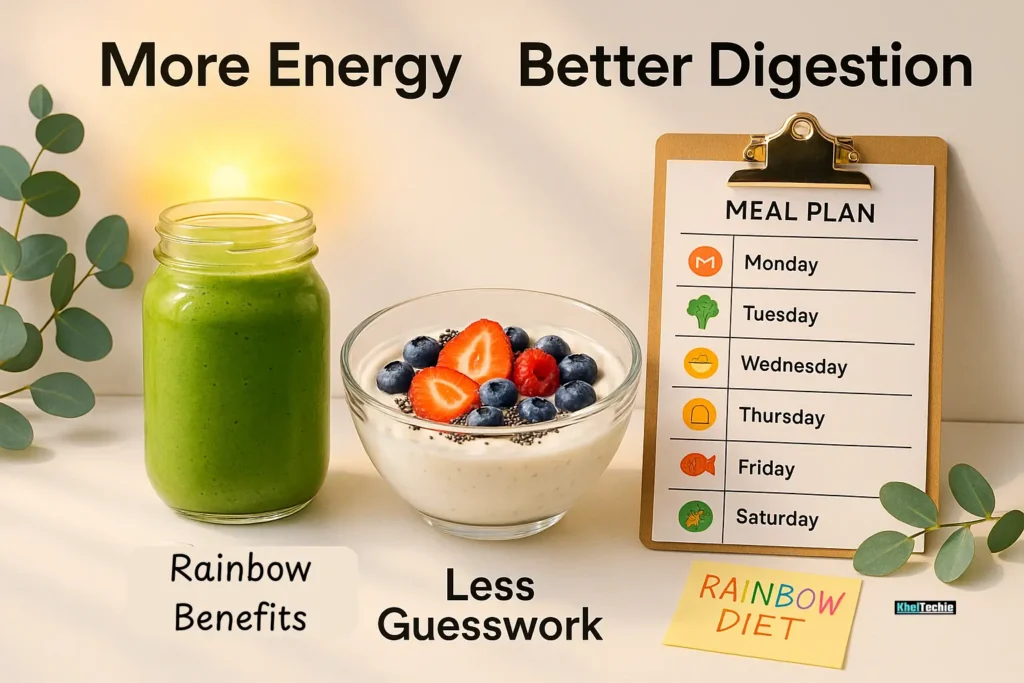
Benefits for Beginners: More Energy, Better Digestion, Less Guesswork
Within the first week of rainbow eating, most folks notice better digestion and more steady energy. Not jittery energy but something real & clean, “I can actually do things today” kind of energy.
Another win? Shopping and meal prep become way easier. You’re not juggling ten different protein powders or searching for goji berries from some far-off land. Just grab what’s in season and aim for every color over the week
Meal prepping becomes easier when you’re working with nature’s candy.
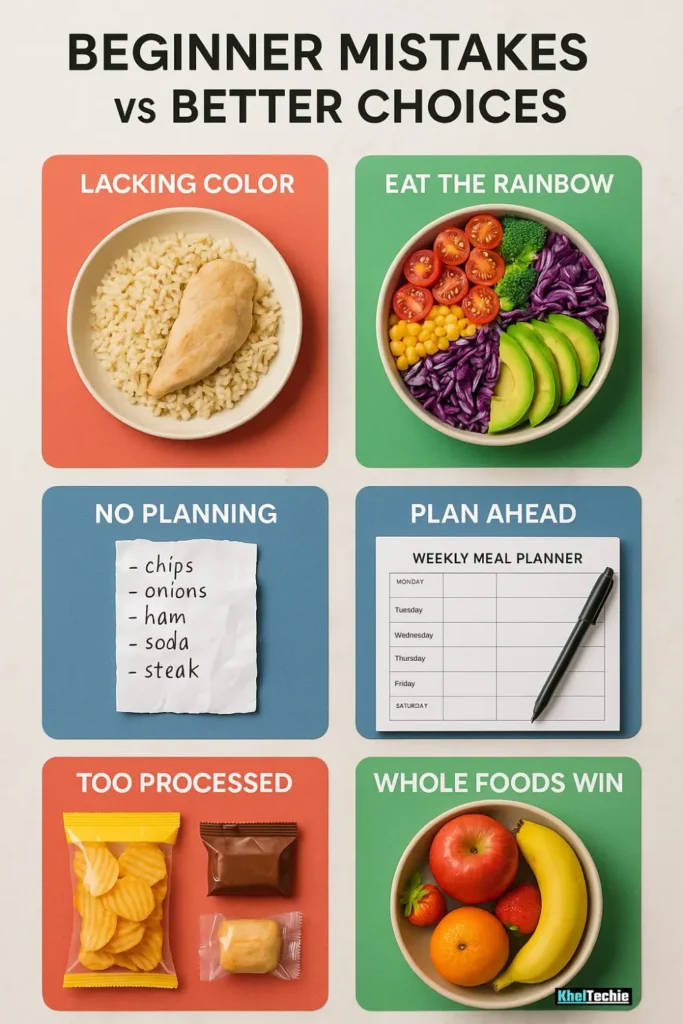
Common Beginner Mistakes & How to Avoid Them
Even with the best intentions, many beginners make miss-steps. Here’s what to watch out for:
| Mistake | Why It Happens | Quick Fix |
|---|---|---|
| Limiting colors to few staples | Comfort zone | Use a bowl + quarterly pop-in of a new color |
| Relying on supplements | Belief pills cover gaps | Whole foods provide fiber & phytonutrients, which supplements can’t |
| Ignoring white‑colored veggies | Thinking white = less nutrient | Garlic/onions have anti-inflammatory anthoxanthins |
| Forgetting protein/fats | Focus on appearance only | Always pair with protein & healthy fat in bowls |
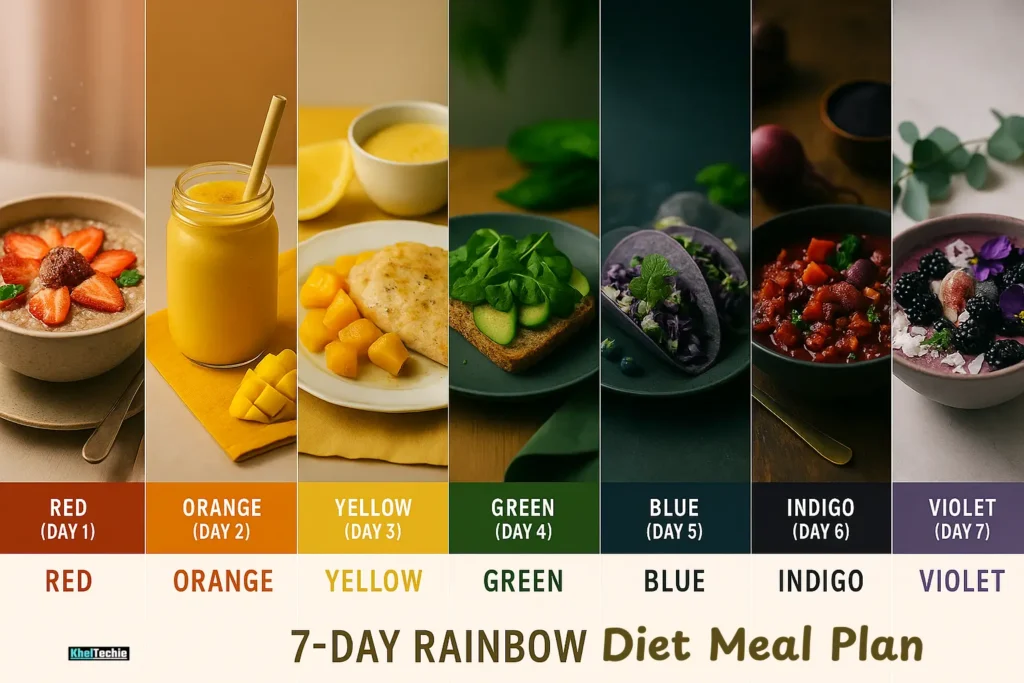
7-Day Rainbow Eating Diet Meal Plan for Beginners
Think of each day as a color adventure. Every meal features that day’s star color with backups from other shades to keep it balanced.
Day 1 – RED
Breakfast: Strawberry-chia oatmeal
Lunch: Tomato + white bean soup
Dinner: Roasted red pepper pasta
Snack: Apple slices + almond butter
Day 2 – ORANGE
Breakfast: Mango smoothie with turmeric
Lunch: Roasted sweet potato wrap
Dinner: Carrot-ginger stir fry
Snack: Dried apricots
Day 3 – YELLOW
Breakfast: Scrambled eggs with yellow bell pepper
Lunch: Corn + quinoa salad
Dinner: Lemon chicken + roasted squash
Snack: Banana
Day 4 – GREEN
Breakfast: Kiwi-spinach smoothie
Lunch: Avocado toast with microgreens
Dinner: Broccoli and pesto pasta
Snack: Snap peas + hummus
Day 5 – BLUE
Breakfast: Blueberry protein pancakes
Lunch: Blue corn tortilla tacos
Dinner: Balsamic chicken with purple cabbage slaw
Snack: Frozen blueberries
Day 6 – INDIGO
Breakfast: Plum + almond yogurt parfait
Lunch: Wild rice and beet salad
Dinner: Eggplant and lentil curry
Snack: Purple grapes
Day 7 – VIOLET
Breakfast: Acai bowl with blackberries
Lunch: Red cabbage and tofu wrap
Dinner: Beet hummus grain bowl
Snack: Fig slices
Swap ingredients based on what’s in season or on sale. The goal is flexibility and joy!
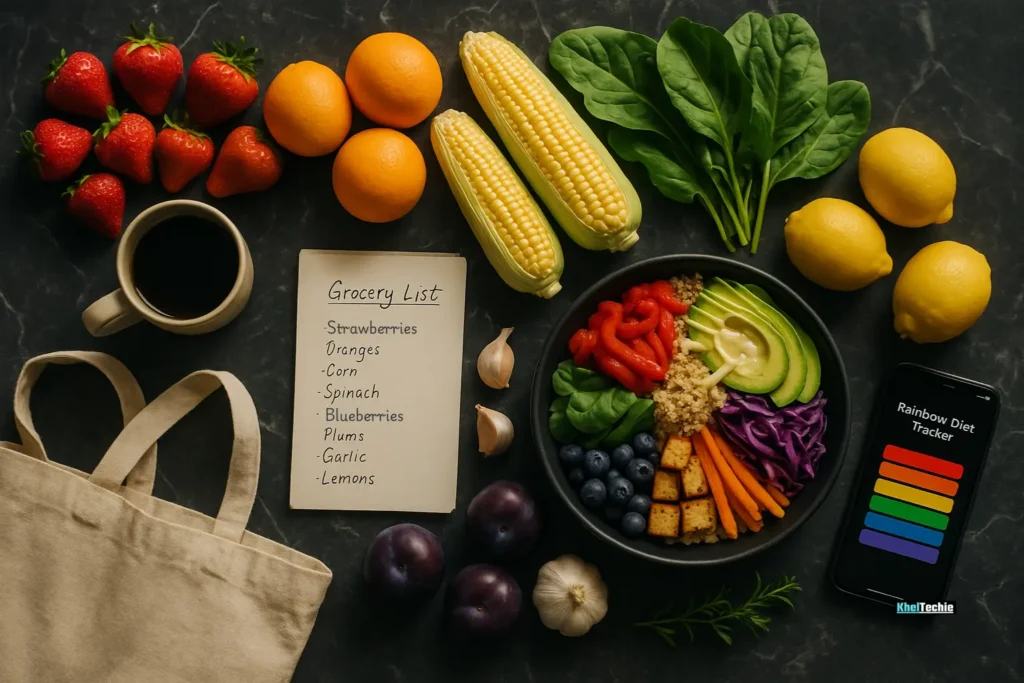
Your Beginner Grocery List by Color (Made for Real-Life Shoppers)
Let’s clear something up, eating the rainbow doesn’t mean you need a second mortgage or a Whole Foods membership. You don’t have to hop between five trendy stores hunting down exotic kale hybrids. Nope, You can find everything you need at your regular grocery store, local farmer’s market or even the discount chain down the block.
Here’s what your rainbow-friendly cart could look like simple, colorful, and totally beginner-proof.
Red foods bring the bold flavor and heart-loving nutrients. Think:
- Juicy strawberries (fresh or frozen both work wonders in smoothies)
- Sweet tomatoes, perfect for sauces or sandwiches
- Crisp red apples for snacking on the go
- Crunchy red bell peppers that work raw, roasted, or tossed in a stir fry
Orange foods are like the sunshine of your plate. Packed with beta carotene and eye health boosters:
- Carrots, which can be roasted, shaved into salads or eaten with hummus like chips
- Cozy sweet potatoes bake ’em, mash ’em, air fry ’em
- Ripe, tropical mangoes, a blender’s best friend
- Classic oranges, easy to toss into lunchboxes or squeeze into salad dressings
Yellow foods often get overlooked, but they’re vibrant and full of flavor.
- Sweet, crunchy corn, frozen, canned, or straight off the cob
- Mild yellow squash, perfect grilled or sautéed with garlic
- Zesty lemons that wake up any dish (or your water bottle)
- Bright yellow bell peppers, great raw or in fajitas
Green foods are the MVPs for gut health, energy, and balance. They’re also super versatile.
- Spinach: sautéed, blended or raw, this stuff does it all
- Creamy avocados, perfect for toast or turning any meal into something extra
- Broccoli, roast it until crispy or steam it with lemon
- Cool, hydrating cucumbers for salads or a quick crunch
Blue, Indigo and Violet foods round out the rainbow with antioxidant power and deep, rich flavors:
- Plump blueberries (again fresh or frozen, zero judgment)
- Deep purple eggplant, which roasts like a dream and soaks up any flavor
- Juicy plums, great for snacking or slicing into oatmeal
- Bright purple cabbage, which adds color, crunch and gut-friendly fiber to any meal
Frozen produce totally counts. In fact, frozen fruits and veggies are often picked at peak ripeness, meaning they’re just as nutritious (if not more) than what’s sitting in the produce section. Stock up your freezer with rainbow staples so you’ve always got back-up, even on your busiest weeks and hey, if your produce drawer gets a little wilted now and then? No shame, You’re learning and you’re already one grocery trip closer to eating better without the overwhelm.
Also read – Best Plant-Based Protein Sources
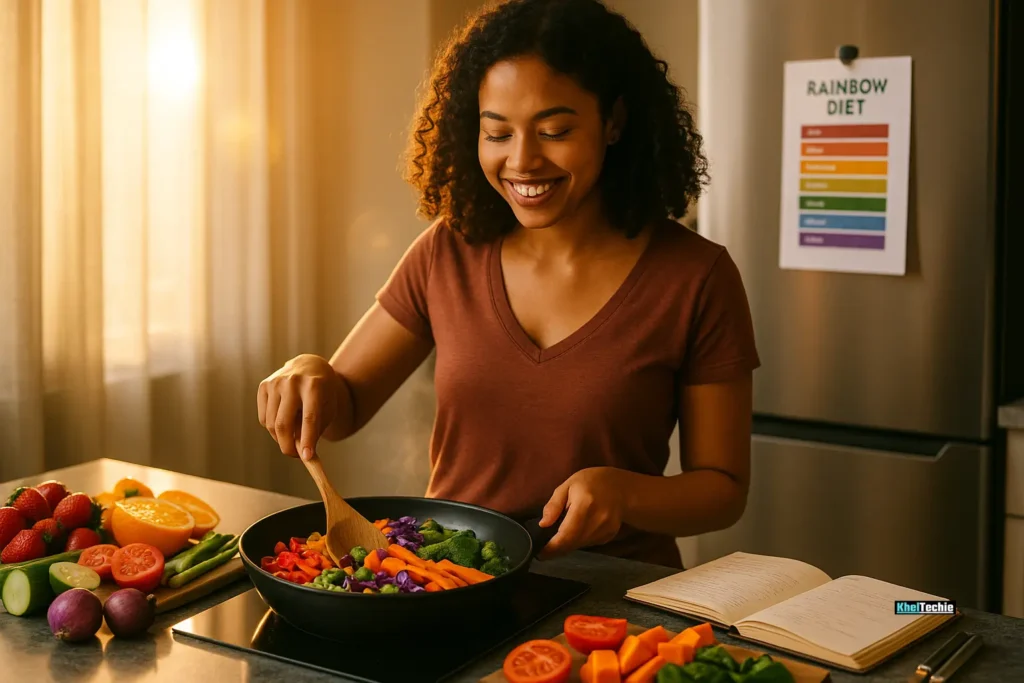
Final Thoughts: Ready to Paint Your Plate with Color?
The Easy Rainbow Eating Diet Meal Plan for Beginners is more than just a way to eat, it’s a lifestyle shift toward better health, happiness and harmony with food. You don’t need to be perfect, just start with one color & then add another, Soon you’ll find yourself craving the vibrant flavors and textures of whole foods and remember, the rainbow isn’t just for summer, You can enjoy colorful eating year-round with frozen fruits, root vegetables and creative cooking techniques.
Grab your notebook, try step 1 tonight. Start with red, Tomorrow? Orange & You’ve got this and hey, one missed day doesn’t break the rainbow, Just pick it back up and keep going. Have questions about the meal plan? Want to swap recipes or share your favorite colorful dish? Drop a comment below.
Eating better doesn’t have to be beige, Let’s grow healthier!🌈
Frequently Asked Questions
Is rainbow eating good for weight loss?
Yes! The focus on fiber-rich, low-calorie produce helps with satiety and reduced processed foods, gently promotes weight management.
Is the Rainbow Diet Expensive?
Not at all. Many colorful foods like carrots, tomatoes, bananas, and cabbage are affordable and widely available. Buying seasonal produce also helps cut costs.
Do I Need to Eat Every Color Every Day?
No, Aim for at least three different colors per day. Over the week, you’ll naturally cover the full spectrum.
Can Kids Follow the Rainbow Diet?
Absolutely! In fact, turning mealtime into a color game makes it fun for kids. Try a “color hunt” at the grocery store or create colorful snack plates together.
What If I Don’t Like Certain Vegetables?
That’s okay! Explore different ways to cook them, roasted, steamed, sautéed, or blended into sauces. Sometimes the method makes all the difference.
How Do I Stay Motivated on the Rainbow Diet?
Set small goals, celebrate progress, and share your meals on social media for accountability. Join online communities for inspiration and recipe swaps.
Can I include meat, eggs, dairy?
Absolutely, While plant-based adds variety, animal proteins provide essential amino acids. The key is color on your plate.
Do I need supplements?
Generally no, except for B12, vitamin D, or omega‑3 if restricted diet; but colorful meals provide phytonutrients and fiber more powerful than supplements alone.
What if I hate cooking?
Use frozen veggies, canned beans, pre-washed greens. Prep in batches. Bowls & stir-fries are easy beginner-friendly.
I always eat white staples rice, potatoes, is that okay?
Yes, in moderation. Just mix in colorful sides. Don’t over-rely on beige, even cauliflower rice helps.

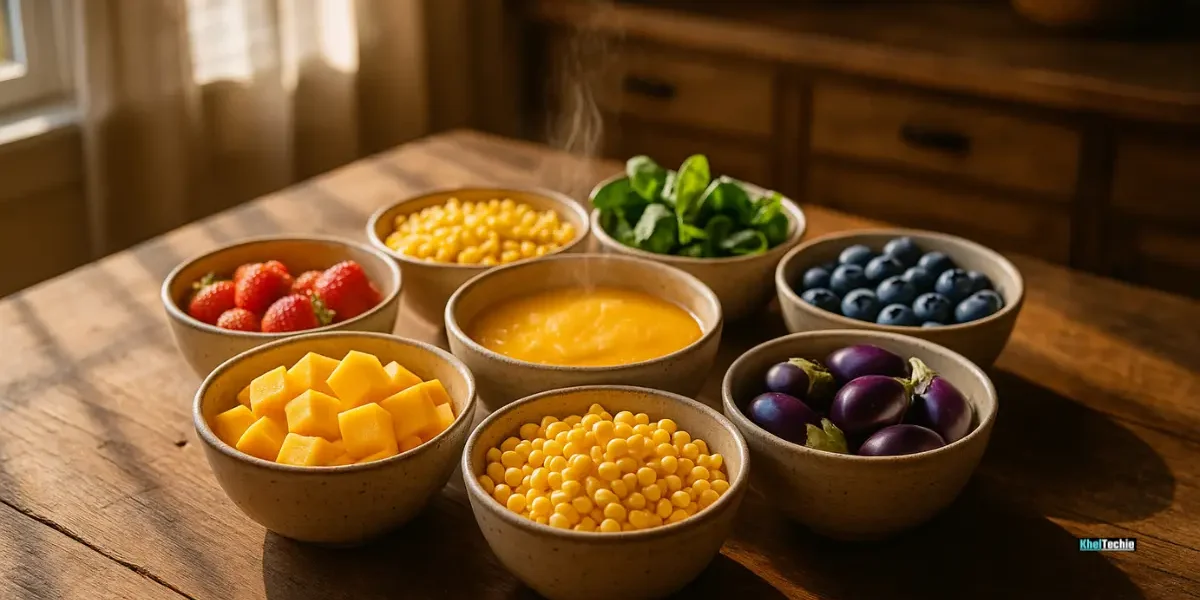



Pingback: Daily Habits For Gut Health 2025: Breakthrough Facts!
Pingback: Top 10 Natural Foods That Keep You Young : Secrets To Youth